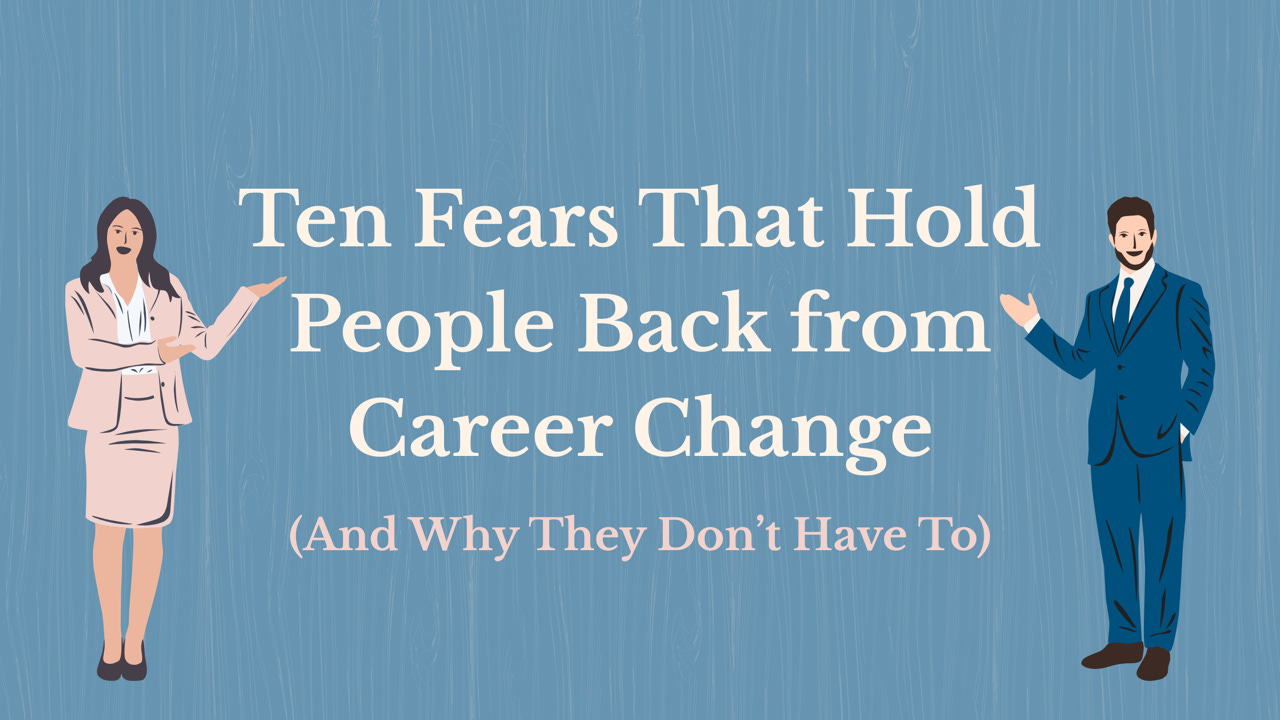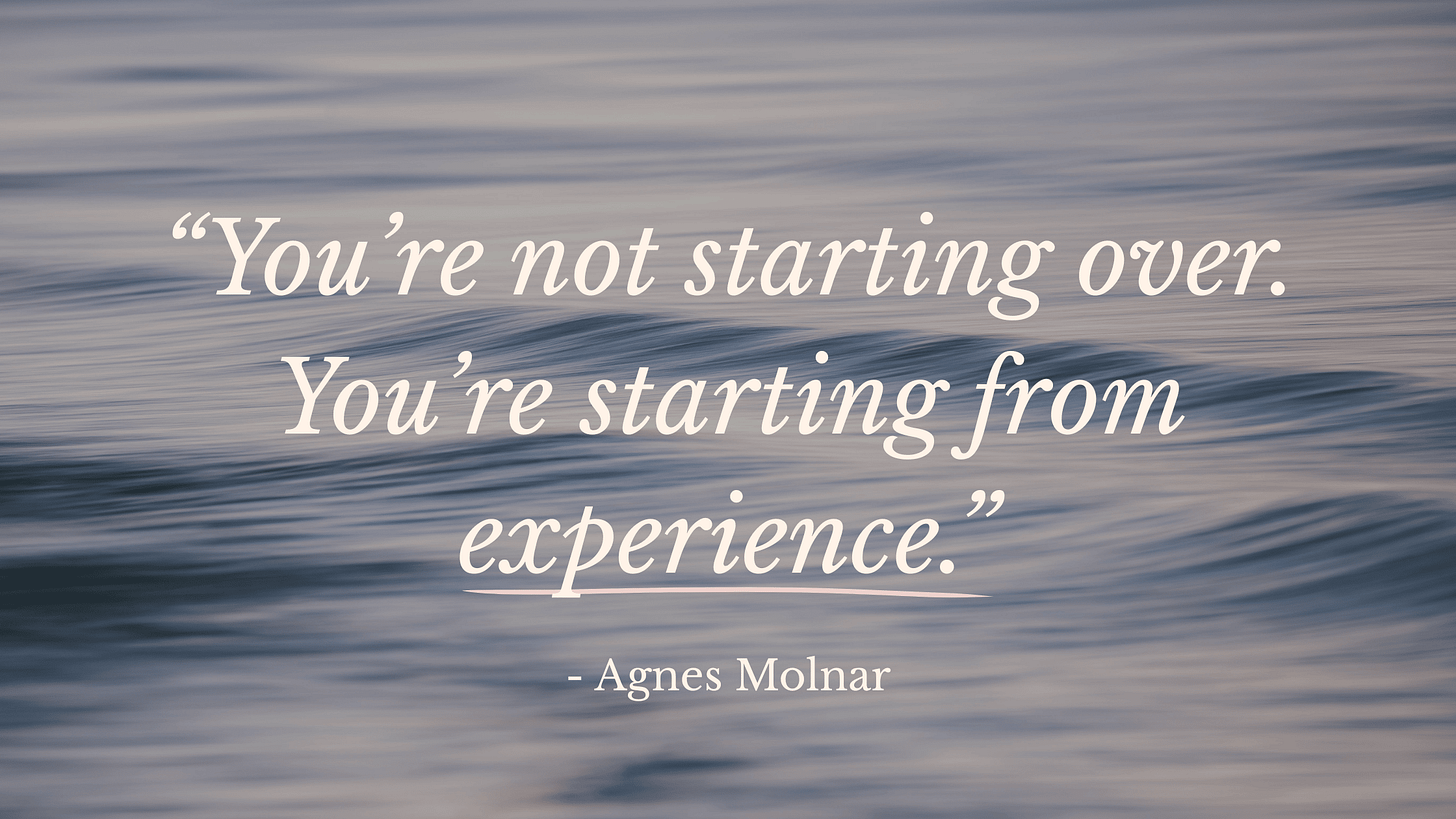Ten Common Fears of Career Changes
Changing careers is rarely a smooth decision.
Whether you’re considering it out of desire or facing it due to a layoff, move, health issues, or other life events, career transitions often trigger fear.
In my coaching work, I’ve seen these fears come up again and again. And I’ve lived through many of them myself.
Here are ten of the most common fears people face during career change and questions to help you navigate them.
1. “It’s Too Late”
Whether you’re 30, 40, 50 or beyond, age is not a barrier to change.
The truth: it’s better to start today than to wonder “what if” ten years from now.
Ask yourself:
What knowledge and experience do I bring with me?
What do my past roles enable me to do today?
Who can I trust with my plans for honest feedback and support?
2. “Career Changes Are Risky and Unstable”
Financial fear is real, but not always accurate. With proper planning, many career shifts are sustainable and even financially beneficial.
Ask yourself:
What’s my current financial reality: savings, expenses, debt?
Do I have a buffer or support system for the transition?
What’s my long-term vision and does this change support it?
3. “I’ll Have to Start from Scratch”
You’re not starting over. You’re starting from experience.
Most skills (especially soft skills) are highly transferable.
Ask yourself:
Which past experiences align with what I want to do next?
How can I reframe my story for a new audience?
Who can help me identify and position my strengths?
4. “Changing Means I’ve Failed”
This fear runs deep. But change doesn’t mean failure, it means growth.
Standing up for yourself isn’t giving up. It’s moving forward.
Ask yourself:
What values are driving this decision?
What might life look like if I never take this step?
Who supports me and how can I lean on them?
5. “I Don’t Have the Right Connections”
Networking helps, but it’s not everything. Self-initiative and visibility go a long way.
Ask yourself:
What content can I create to share my knowledge and interest?
How can I improve my online presence (Substack, LinkedIn, website, etc.)?
Are there communities I can join or projects I can volunteer for?
6. “I Can’t Switch to Something Completely Different”
You can. I’ve done it. Many of my clients have, too.
The key is being honest about what you want and taking intentional steps.
Ask yourself:
What excites me about this new direction?
What skills or experience can I carry over?
Who can help me navigate the shift?
7. “I Need a Clear Plan Before I Start”
Plans are helpful, but so is flexibility. A career change can be an experiment, not a final answer.
Ask yourself:
What small steps can I take before making a big move?
Can I test this path through part-time or freelance work?
What would a flexible, evolving plan look like for me?
8. “It’s Too Much Work”
Yes, it can be work. But not changing can be heavier.
The effort you put in now can lead to long-term fulfillment.
Ask yourself:
What part of this transition feels hardest and can I get help?
What excites me about the new path?
What support do I need to keep going without burning out?
9. “I’ll Disappoint My Family or Friends”
Some people may not understand your decision and yes, that’s painful.
But your career is your life, and your fulfillment matters.
Ask yourself:
Whose approval am I afraid to lose and why?
Who truly supports me?
What do I risk by staying where I am?
10. “What If I Regret It?”
Fear and excitement often show up together.
Regret is possible, but so is staying stuck and wondering “what if.”
Ask yourself:
What does “success” mean to me beyond title or salary?
What has past change taught me about my own resilience?
What support systems can I put in place to navigate uncertainty?
+1: “My Current Job Is Safe”
You may feel secure now and that’s great.
But that doesn’t mean others are. Or that change won’t come later.
Please: If you’re in a place of stability, be someone who supports others on their journey. Offer perspective. Offer encouragement.
Change isn’t easy, but neither is staying stuck.
If you’re feeling the pull toward something new, that voice matters.
You don’t need a perfect plan. You just need the next step.
Take a breath. Ask better questions. And remember:
You’re not behind, you’re arriving.
If you’d like to explore this topic further in a 1:1 setting, book a free discovery call.
Sometimes one honest conversation is all it takes to move forward with more clarity.




That’s a very good piece of text.